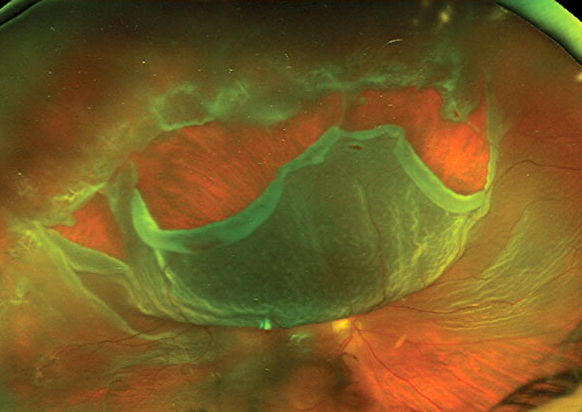 |
|
Visual outcomes in macula-off RRD repair within three days from symptom onset were superior to those from repair between four and seven days. For macula-involving RRD repair, initiating surgery within the first 24 hours showed the most superior outcomes. Photo: Mohammad Rafieetary, OD. Click image to enlarge. |
It is a critical area of research to establish time frames for when to perform vision-saving ocular procedures—such as retinal detachment—after symptom onset to increase the chance of a positive outcome. The conventional approach for rhegmatogenous retinal detachment (RRD) repair recommends treating macula-on RRDs within one to two days and macula-off RRDs within seven days. New data from a recent meta-analysis challenges these longstanding guidelines: it found that for macula-off RRD, initiating the procedure between zero and three days after symptom onset resulted in better visual outcomes than performing the surgery between days four and seven. For macula-involving RRD repair, initiating surgery within the first 24 hours (rather than the recommended 24 to 48 hours) was shown to achieve the most superior outcomes.
The research team searched three large databases for randomized controlled trials and observational studies that compared best-corrected visual acuity (BCVA) outcomes with time to RRD repair. They found data from 20 studies, reporting on a total of 1,929 patients, to include in the analysis.
Macula-off RRD repair within three days from symptom onset was superior to repair between four and seven days with a 95% confidence interval in terms of postoperative BCVA outcomes. Repairing a macula-on RRD was most effective (superior final BCVA) if done on the same day of symptom onset rather than putting the surgery off for longer than 24 hours; however, the mean change in BCVA was comparable in patients receiving surgery before or after the 24-hour mark.
The researchers point out that these findings are not conclusive and may have been influenced by differences in baseline BCVA and small sample sizes in many of the observed studies. They also note that the differences were small between visual outcomes of repair times.
Although further studies on this topic are warranted, the researchers conclude in their paper in American Journal of Ophthalmology that “Modern retinal reattachment techniques are associated with excellent BCVA outcomes in most eyes. Macula-off RRD repair within three days of symptom onset may have a 0.06 logMAR (~three Snellen letters) superior final VA compared to repair in four to seven days. Macula-on RRD repaired within 24 hours of presentation may provide superior VA outcomes (-0.02 logMAR, ~1 Snellen letter) compared to repair in more than 24 hours.”
Sothivannan A, Eshtiaghi A, Dhoot AS, et al. Impact of the time to surgery on visual outcomes for rhegmatogenous retinal detachment repair: a meta-analysis. Am J of Ophthalmol. August 3, 2022. [Epub ahead of print]. |


